Strategic Project Management: De Grandis Case Study Analysis
VerifiedAdded on 2022/10/01
|12
|1034
|169
Report
AI Summary
This report provides a comprehensive analysis of the De Grandis Sporting Goods case studies, focusing on three projects: De Grandis Running Shoes, the Australian Olympic Committee (AOC) Partnership, and Ladybird Sporting Apparel. The analysis evaluates each project's alignment with strategic goals and ethical standards, highlighting issues such as child labor, bribe scandals, and product quality concerns. The report includes Project Performance Scorecards (PPS) for each case, examining vision and strategy, financial aspects, customer satisfaction, internal business processes, and growth. It concludes with recommendations for project improvement, emphasizing the importance of maintaining ethical conduct, formal relationships, and quality control. The report references several academic sources to support its findings and recommendations, offering a detailed examination of project management and strategic considerations within the context of the De Grandis case studies.
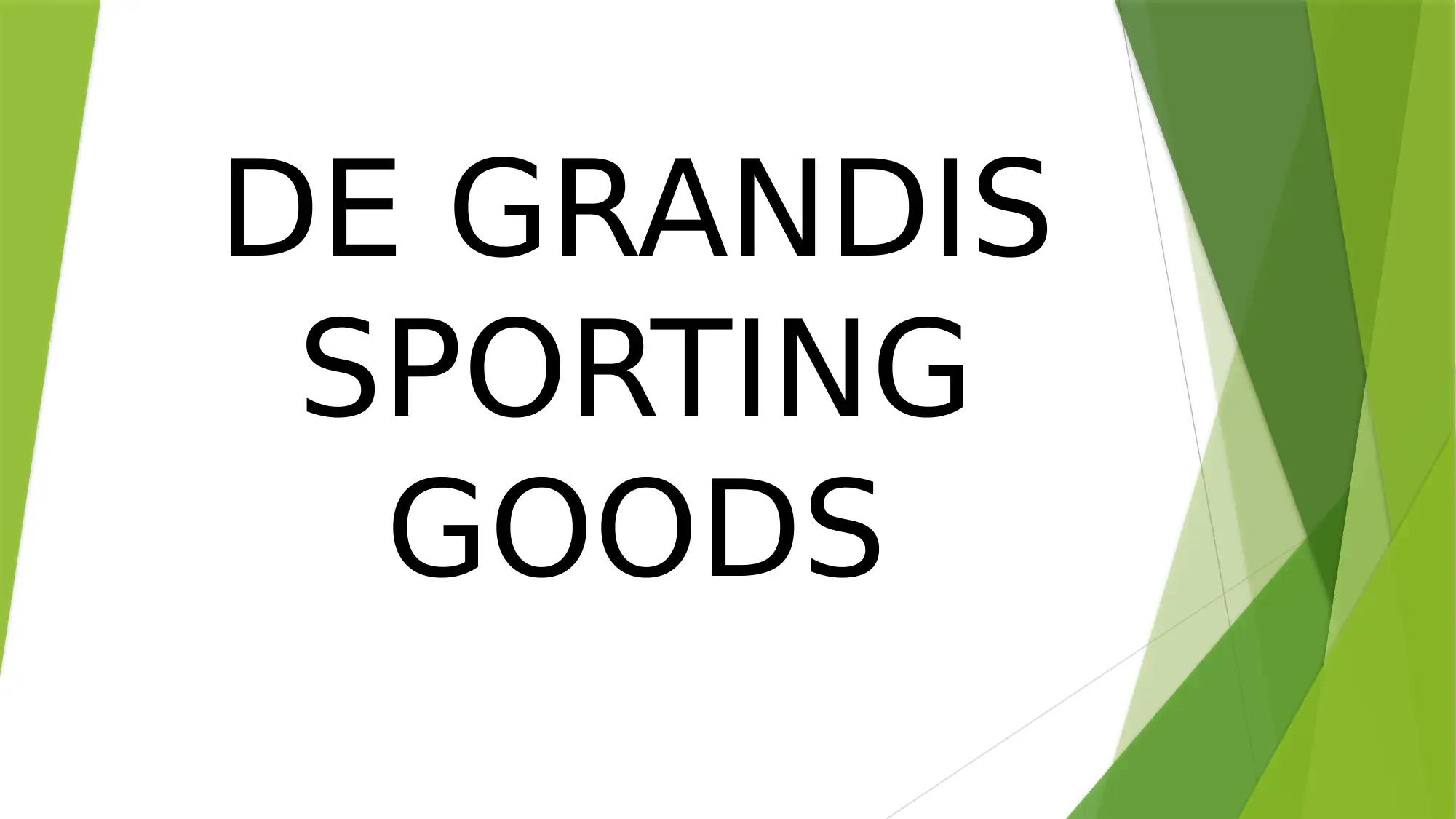
DE GRANDIS
SPORTING
GOODS
SPORTING
GOODS
Paraphrase This Document
Need a fresh take? Get an instant paraphrase of this document with our AI Paraphraser
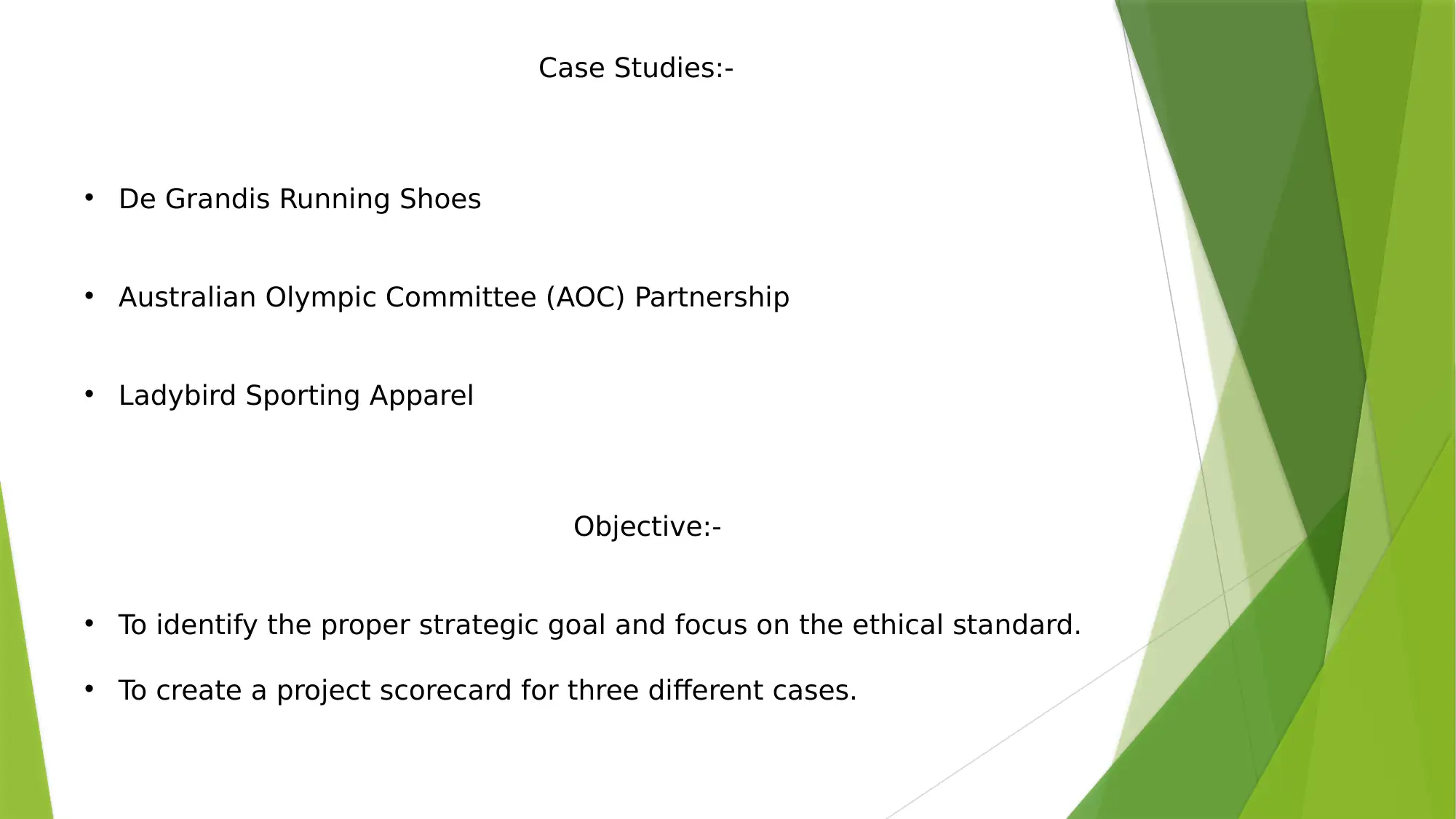
Case Studies:-
• De Grandis Running Shoes
• Australian Olympic Committee (AOC) Partnership
• Ladybird Sporting Apparel
Objective:-
• To identify the proper strategic goal and focus on the ethical standard.
• To create a project scorecard for three different cases.
• De Grandis Running Shoes
• Australian Olympic Committee (AOC) Partnership
• Ladybird Sporting Apparel
Objective:-
• To identify the proper strategic goal and focus on the ethical standard.
• To create a project scorecard for three different cases.
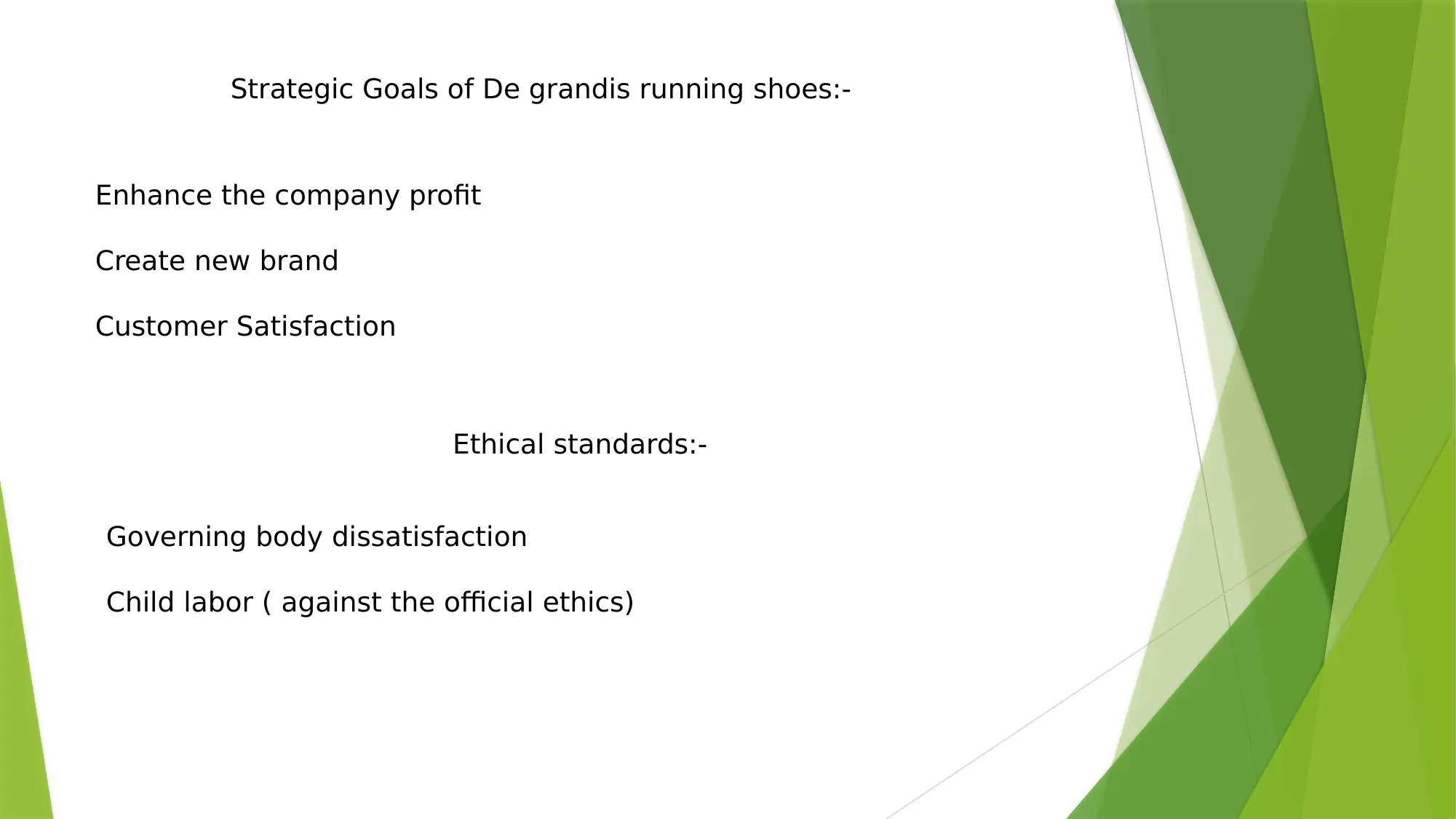
Strategic Goals of De grandis running shoes:-
Enhance the company profit
Create new brand
Customer Satisfaction
Ethical standards:-
Governing body dissatisfaction
Child labor ( against the official ethics)
Enhance the company profit
Create new brand
Customer Satisfaction
Ethical standards:-
Governing body dissatisfaction
Child labor ( against the official ethics)
⊘ This is a preview!⊘
Do you want full access?
Subscribe today to unlock all pages.

Trusted by 1+ million students worldwide
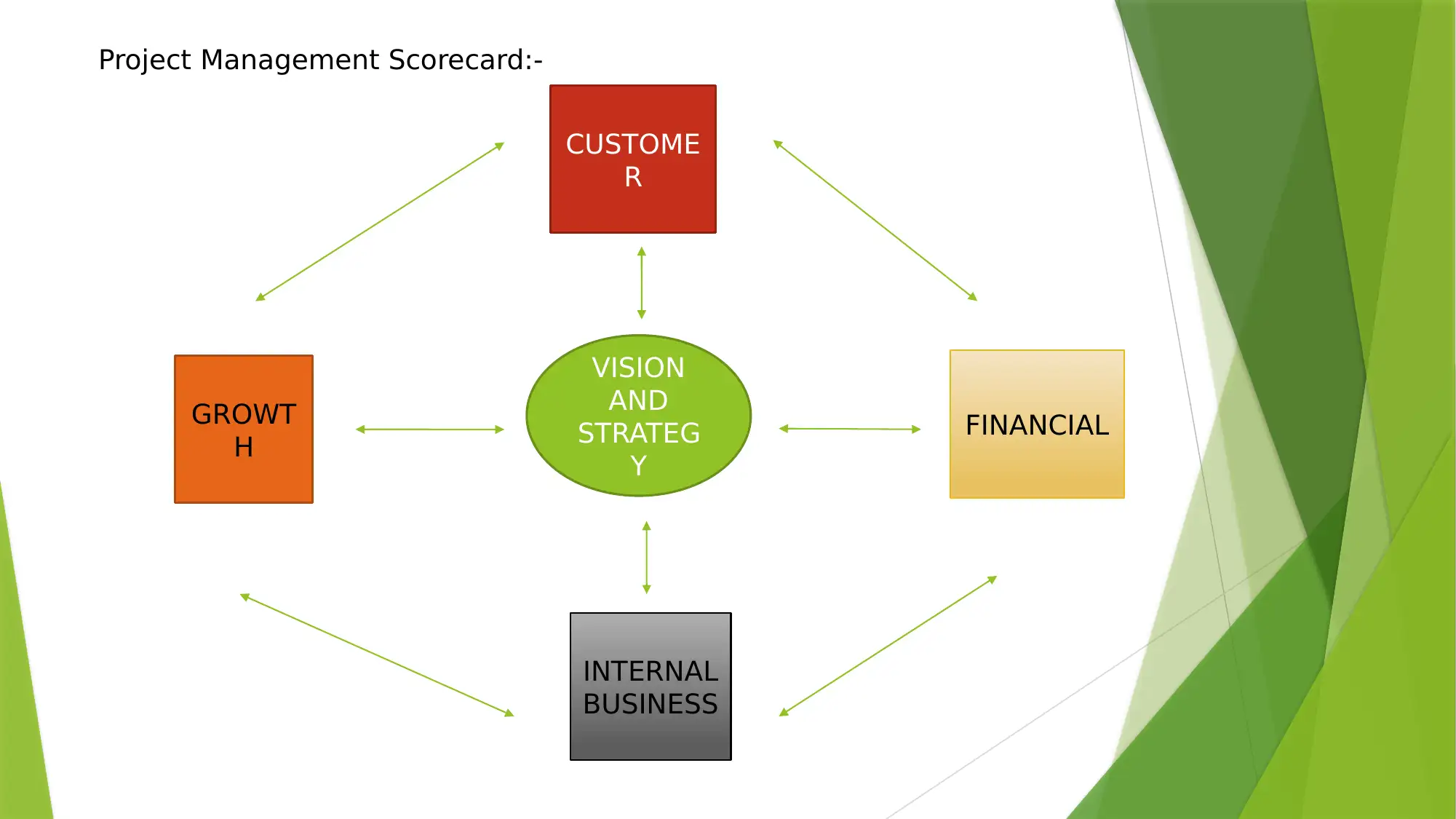
Project Management Scorecard:-
VISION
AND
STRATEG
Y
FINANCIAL
CUSTOME
R
INTERNAL
BUSINESS
GROWT
H
VISION
AND
STRATEG
Y
FINANCIAL
CUSTOME
R
INTERNAL
BUSINESS
GROWT
H
Paraphrase This Document
Need a fresh take? Get an instant paraphrase of this document with our AI Paraphraser
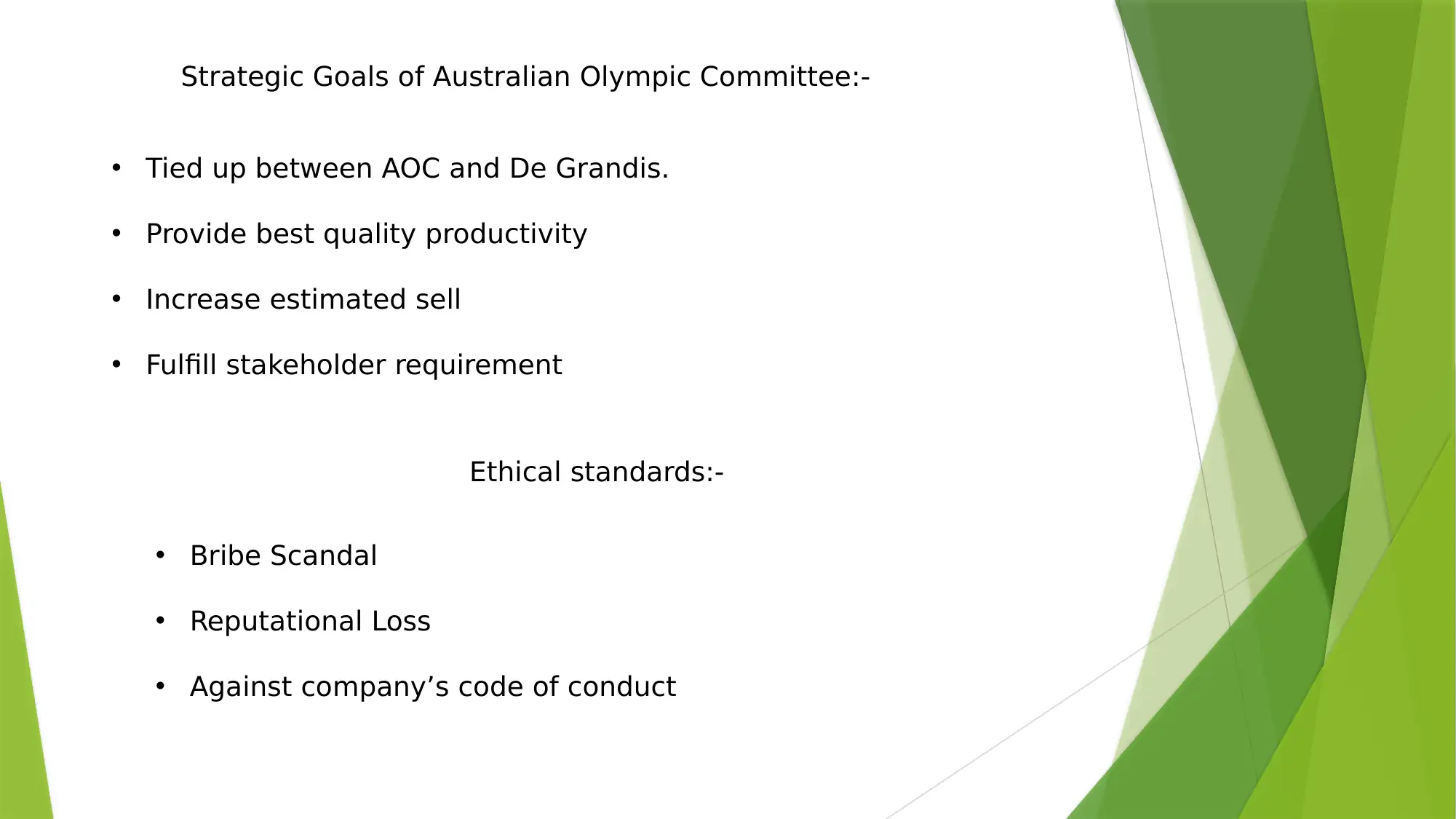
Strategic Goals of Australian Olympic Committee:-
• Tied up between AOC and De Grandis.
• Provide best quality productivity
• Increase estimated sell
• Fulfill stakeholder requirement
Ethical standards:-
• Bribe Scandal
• Reputational Loss
• Against company’s code of conduct
• Tied up between AOC and De Grandis.
• Provide best quality productivity
• Increase estimated sell
• Fulfill stakeholder requirement
Ethical standards:-
• Bribe Scandal
• Reputational Loss
• Against company’s code of conduct
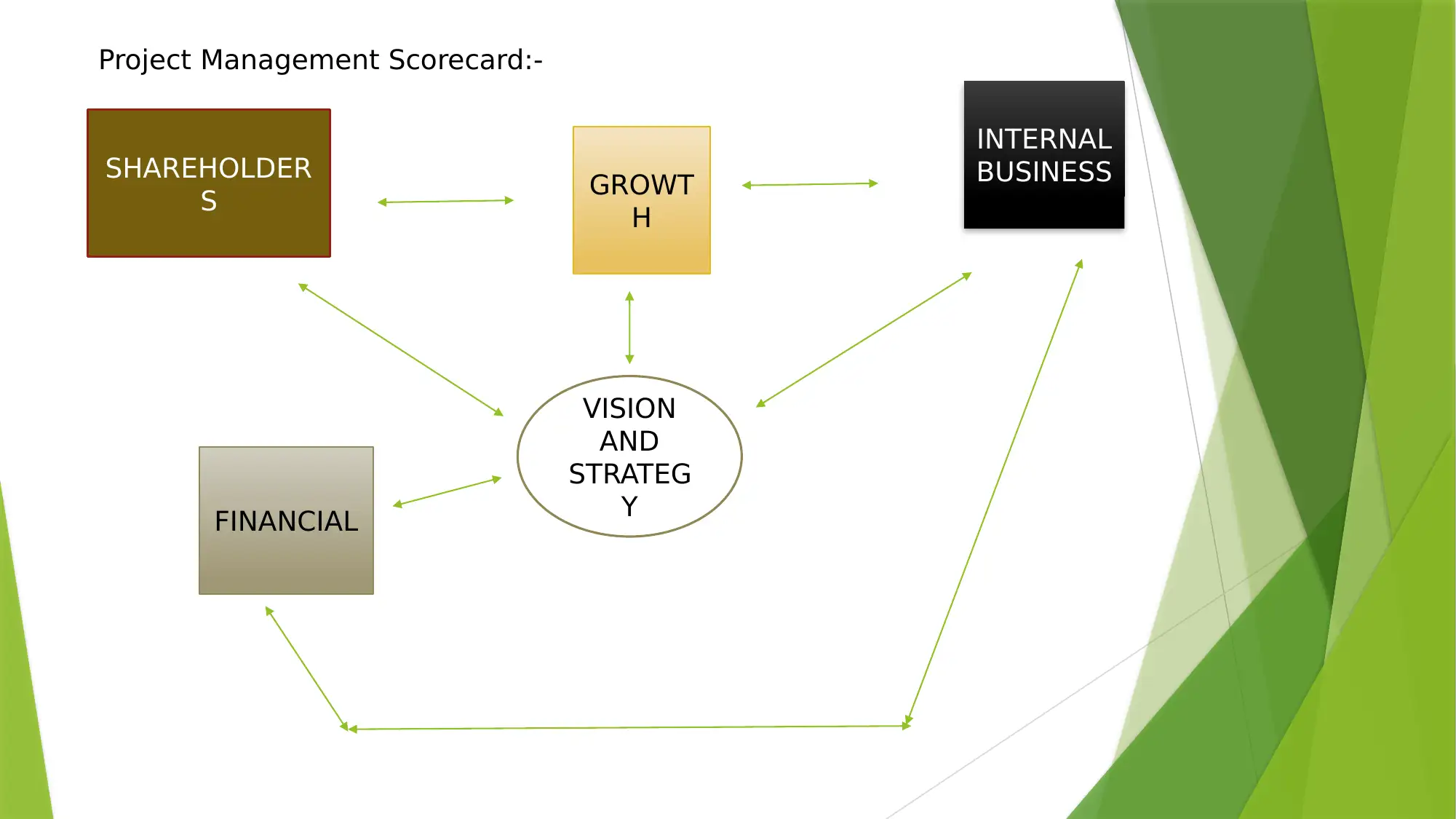
Project Management Scorecard:-
VISION
AND
STRATEG
Y
FINANCIAL
SHAREHOLDER
S
INTERNAL
BUSINESSGROWT
H
VISION
AND
STRATEG
Y
FINANCIAL
SHAREHOLDER
S
INTERNAL
BUSINESSGROWT
H
⊘ This is a preview!⊘
Do you want full access?
Subscribe today to unlock all pages.

Trusted by 1+ million students worldwide
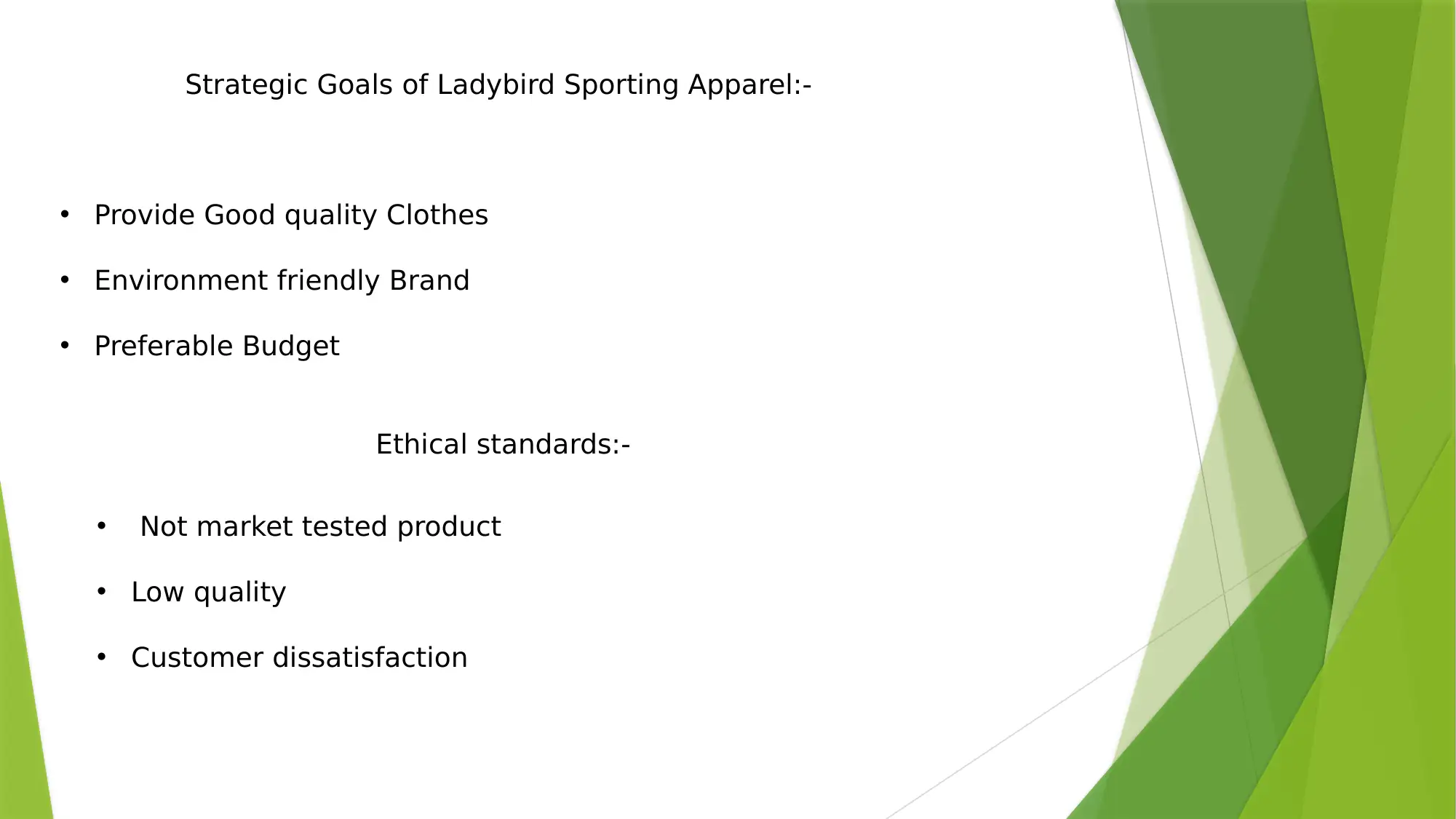
Strategic Goals of Ladybird Sporting Apparel:-
• Provide Good quality Clothes
• Environment friendly Brand
• Preferable Budget
Ethical standards:-
• Not market tested product
• Low quality
• Customer dissatisfaction
• Provide Good quality Clothes
• Environment friendly Brand
• Preferable Budget
Ethical standards:-
• Not market tested product
• Low quality
• Customer dissatisfaction
Paraphrase This Document
Need a fresh take? Get an instant paraphrase of this document with our AI Paraphraser
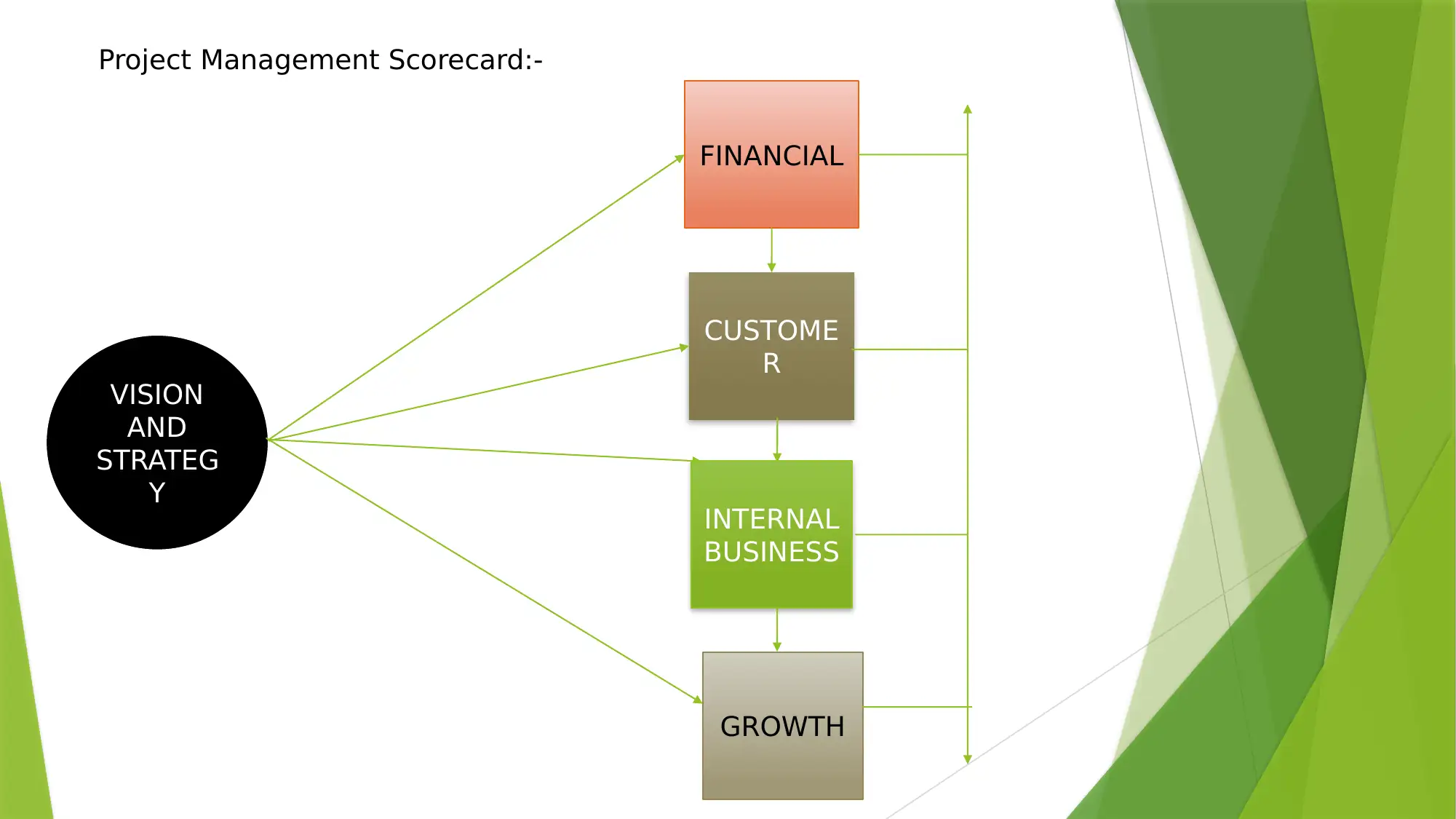
Project Management Scorecard:-
VISION
AND
STRATEG
Y
FINANCIAL
CUSTOME
R
INTERNAL
BUSINESS
GROWTH
VISION
AND
STRATEG
Y
FINANCIAL
CUSTOME
R
INTERNAL
BUSINESS
GROWTH
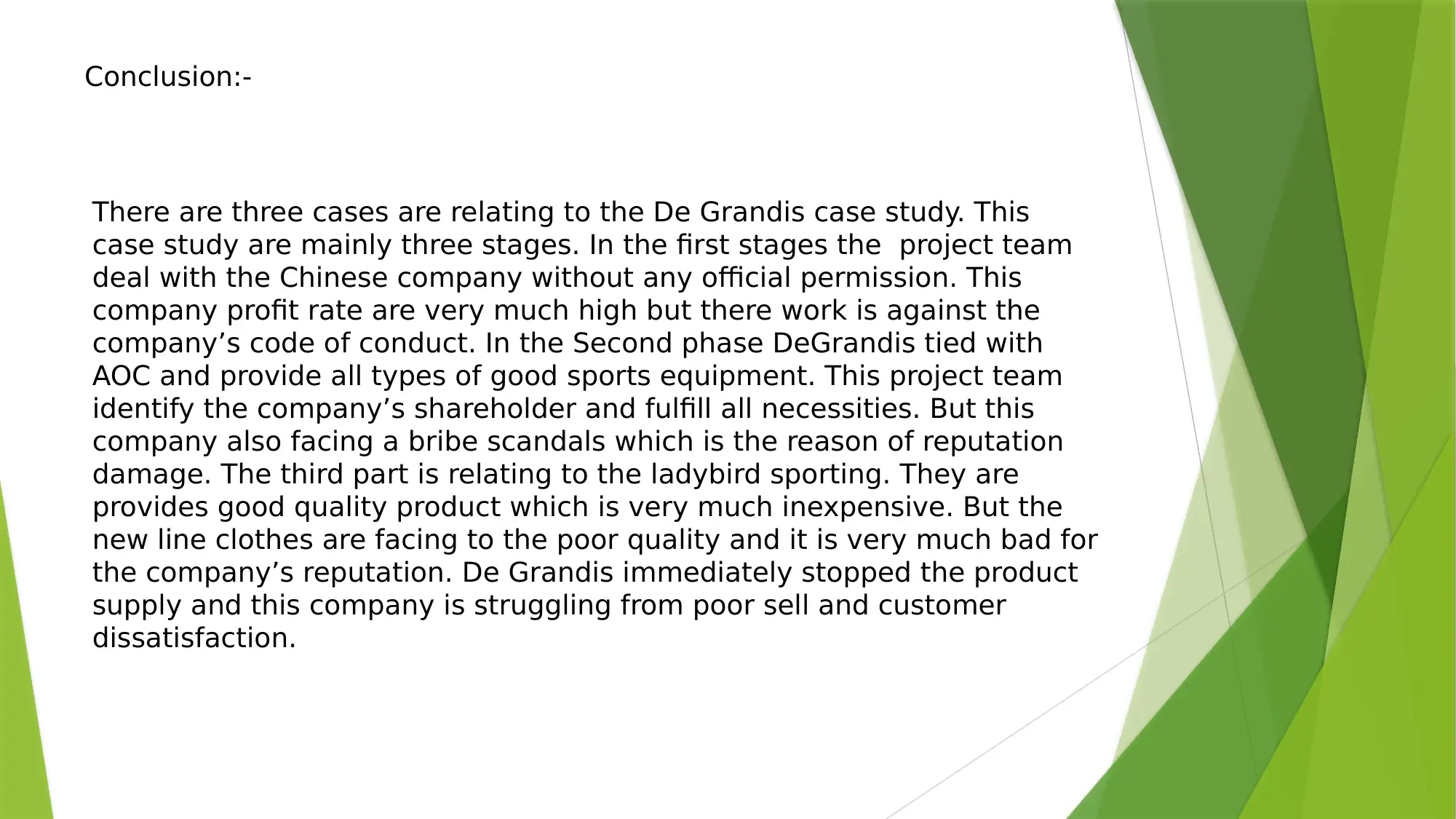
Conclusion:-
There are three cases are relating to the De Grandis case study. This
case study are mainly three stages. In the first stages the project team
deal with the Chinese company without any official permission. This
company profit rate are very much high but there work is against the
company’s code of conduct. In the Second phase DeGrandis tied with
AOC and provide all types of good sports equipment. This project team
identify the company’s shareholder and fulfill all necessities. But this
company also facing a bribe scandals which is the reason of reputation
damage. The third part is relating to the ladybird sporting. They are
provides good quality product which is very much inexpensive. But the
new line clothes are facing to the poor quality and it is very much bad for
the company’s reputation. De Grandis immediately stopped the product
supply and this company is struggling from poor sell and customer
dissatisfaction.
There are three cases are relating to the De Grandis case study. This
case study are mainly three stages. In the first stages the project team
deal with the Chinese company without any official permission. This
company profit rate are very much high but there work is against the
company’s code of conduct. In the Second phase DeGrandis tied with
AOC and provide all types of good sports equipment. This project team
identify the company’s shareholder and fulfill all necessities. But this
company also facing a bribe scandals which is the reason of reputation
damage. The third part is relating to the ladybird sporting. They are
provides good quality product which is very much inexpensive. But the
new line clothes are facing to the poor quality and it is very much bad for
the company’s reputation. De Grandis immediately stopped the product
supply and this company is struggling from poor sell and customer
dissatisfaction.
⊘ This is a preview!⊘
Do you want full access?
Subscribe today to unlock all pages.

Trusted by 1+ million students worldwide
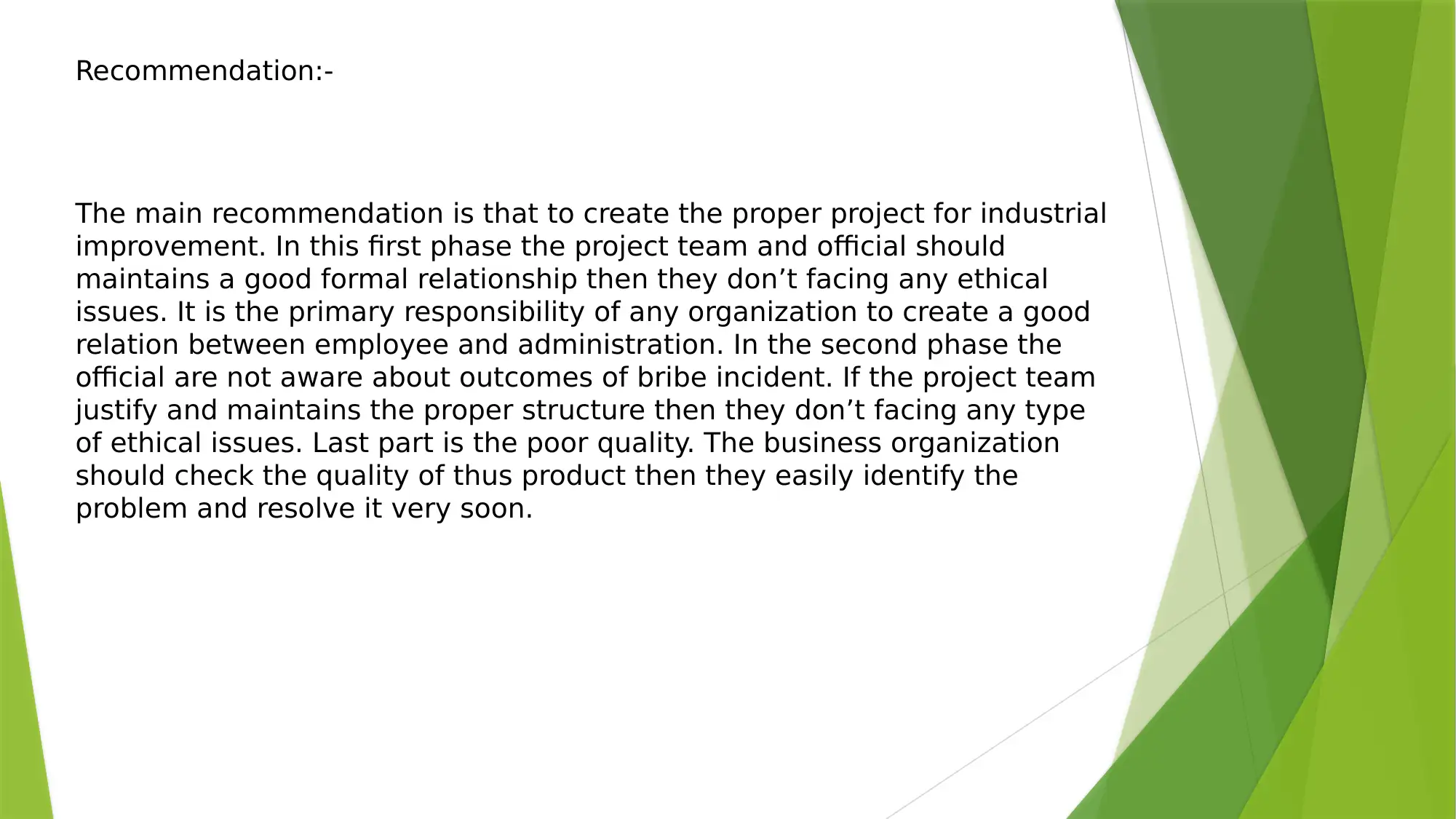
Recommendation:-
The main recommendation is that to create the proper project for industrial
improvement. In this first phase the project team and official should
maintains a good formal relationship then they don’t facing any ethical
issues. It is the primary responsibility of any organization to create a good
relation between employee and administration. In the second phase the
official are not aware about outcomes of bribe incident. If the project team
justify and maintains the proper structure then they don’t facing any type
of ethical issues. Last part is the poor quality. The business organization
should check the quality of thus product then they easily identify the
problem and resolve it very soon.
The main recommendation is that to create the proper project for industrial
improvement. In this first phase the project team and official should
maintains a good formal relationship then they don’t facing any ethical
issues. It is the primary responsibility of any organization to create a good
relation between employee and administration. In the second phase the
official are not aware about outcomes of bribe incident. If the project team
justify and maintains the proper structure then they don’t facing any type
of ethical issues. Last part is the poor quality. The business organization
should check the quality of thus product then they easily identify the
problem and resolve it very soon.
Paraphrase This Document
Need a fresh take? Get an instant paraphrase of this document with our AI Paraphraser
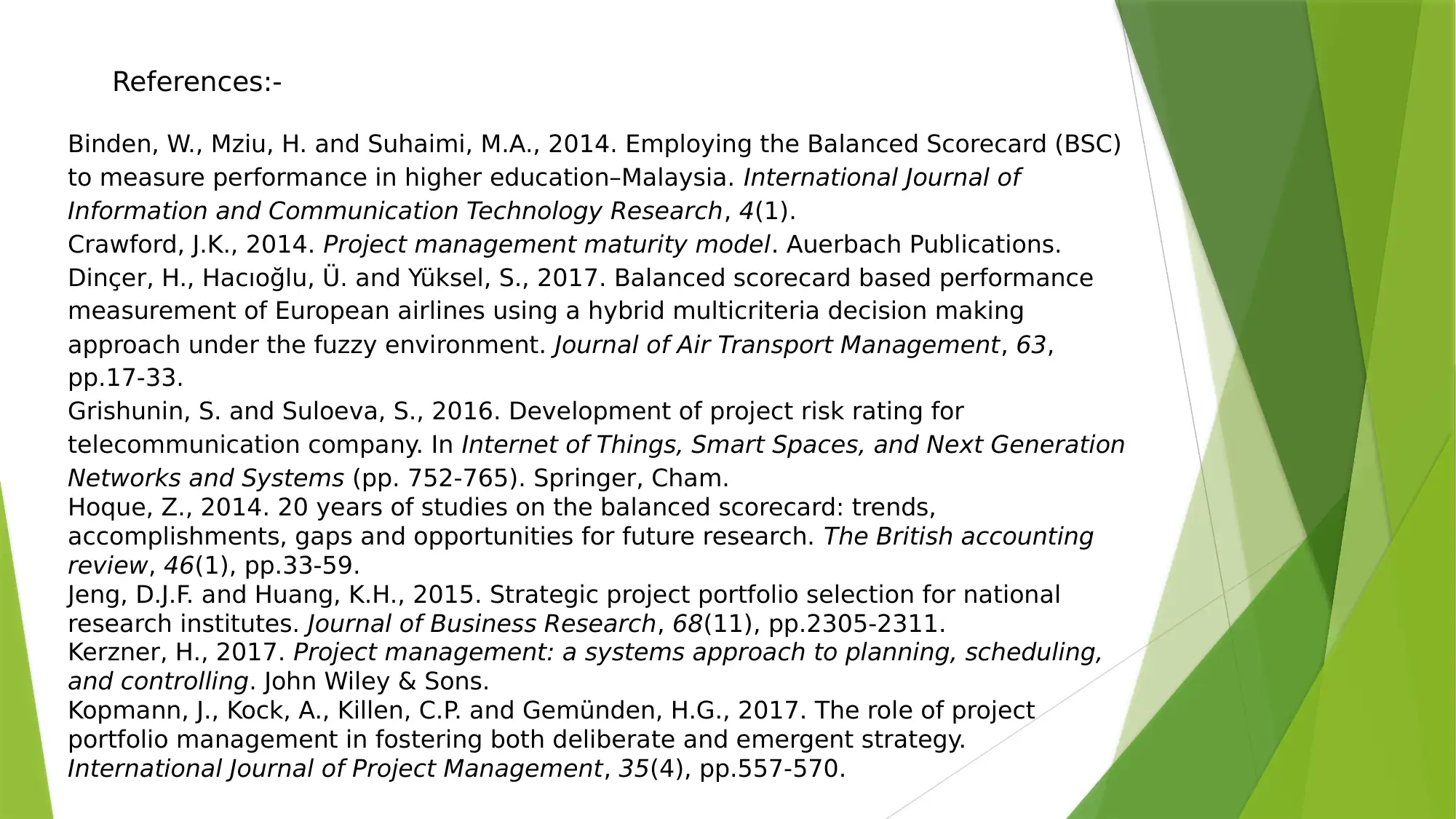
References:-
Binden, W., Mziu, H. and Suhaimi, M.A., 2014. Employing the Balanced Scorecard (BSC)
to measure performance in higher education–Malaysia. International Journal of
Information and Communication Technology Research, 4(1).
Crawford, J.K., 2014. Project management maturity model. Auerbach Publications.
Dinçer, H., Hacıoğlu, Ü. and Yüksel, S., 2017. Balanced scorecard based performance
measurement of European airlines using a hybrid multicriteria decision making
approach under the fuzzy environment. Journal of Air Transport Management, 63,
pp.17-33.
Grishunin, S. and Suloeva, S., 2016. Development of project risk rating for
telecommunication company. In Internet of Things, Smart Spaces, and Next Generation
Networks and Systems (pp. 752-765). Springer, Cham.
Hoque, Z., 2014. 20 years of studies on the balanced scorecard: trends,
accomplishments, gaps and opportunities for future research. The British accounting
review, 46(1), pp.33-59.
Jeng, D.J.F. and Huang, K.H., 2015. Strategic project portfolio selection for national
research institutes. Journal of Business Research, 68(11), pp.2305-2311.
Kerzner, H., 2017. Project management: a systems approach to planning, scheduling,
and controlling. John Wiley & Sons.
Kopmann, J., Kock, A., Killen, C.P. and Gemünden, H.G., 2017. The role of project
portfolio management in fostering both deliberate and emergent strategy.
International Journal of Project Management, 35(4), pp.557-570.
Binden, W., Mziu, H. and Suhaimi, M.A., 2014. Employing the Balanced Scorecard (BSC)
to measure performance in higher education–Malaysia. International Journal of
Information and Communication Technology Research, 4(1).
Crawford, J.K., 2014. Project management maturity model. Auerbach Publications.
Dinçer, H., Hacıoğlu, Ü. and Yüksel, S., 2017. Balanced scorecard based performance
measurement of European airlines using a hybrid multicriteria decision making
approach under the fuzzy environment. Journal of Air Transport Management, 63,
pp.17-33.
Grishunin, S. and Suloeva, S., 2016. Development of project risk rating for
telecommunication company. In Internet of Things, Smart Spaces, and Next Generation
Networks and Systems (pp. 752-765). Springer, Cham.
Hoque, Z., 2014. 20 years of studies on the balanced scorecard: trends,
accomplishments, gaps and opportunities for future research. The British accounting
review, 46(1), pp.33-59.
Jeng, D.J.F. and Huang, K.H., 2015. Strategic project portfolio selection for national
research institutes. Journal of Business Research, 68(11), pp.2305-2311.
Kerzner, H., 2017. Project management: a systems approach to planning, scheduling,
and controlling. John Wiley & Sons.
Kopmann, J., Kock, A., Killen, C.P. and Gemünden, H.G., 2017. The role of project
portfolio management in fostering both deliberate and emergent strategy.
International Journal of Project Management, 35(4), pp.557-570.
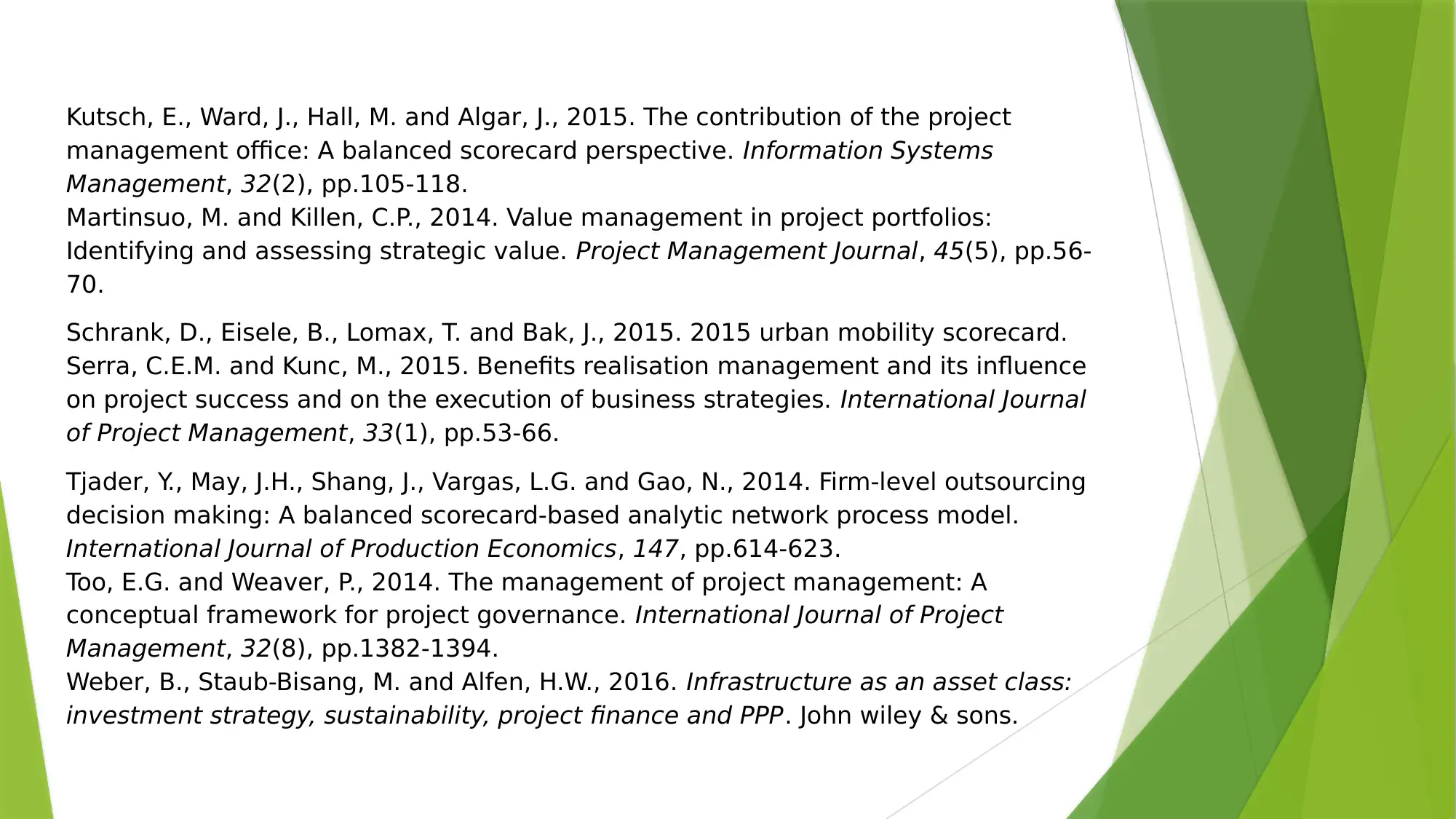
Kutsch, E., Ward, J., Hall, M. and Algar, J., 2015. The contribution of the project
management office: A balanced scorecard perspective. Information Systems
Management, 32(2), pp.105-118.
Martinsuo, M. and Killen, C.P., 2014. Value management in project portfolios:
Identifying and assessing strategic value. Project Management Journal, 45(5), pp.56-
70.
Schrank, D., Eisele, B., Lomax, T. and Bak, J., 2015. 2015 urban mobility scorecard.
Serra, C.E.M. and Kunc, M., 2015. Benefits realisation management and its influence
on project success and on the execution of business strategies. International Journal
of Project Management, 33(1), pp.53-66.
Tjader, Y., May, J.H., Shang, J., Vargas, L.G. and Gao, N., 2014. Firm-level outsourcing
decision making: A balanced scorecard-based analytic network process model.
International Journal of Production Economics, 147, pp.614-623.
Too, E.G. and Weaver, P., 2014. The management of project management: A
conceptual framework for project governance. International Journal of Project
Management, 32(8), pp.1382-1394.
Weber, B., Staub-Bisang, M. and Alfen, H.W., 2016. Infrastructure as an asset class:
investment strategy, sustainability, project finance and PPP. John wiley & sons.
management office: A balanced scorecard perspective. Information Systems
Management, 32(2), pp.105-118.
Martinsuo, M. and Killen, C.P., 2014. Value management in project portfolios:
Identifying and assessing strategic value. Project Management Journal, 45(5), pp.56-
70.
Schrank, D., Eisele, B., Lomax, T. and Bak, J., 2015. 2015 urban mobility scorecard.
Serra, C.E.M. and Kunc, M., 2015. Benefits realisation management and its influence
on project success and on the execution of business strategies. International Journal
of Project Management, 33(1), pp.53-66.
Tjader, Y., May, J.H., Shang, J., Vargas, L.G. and Gao, N., 2014. Firm-level outsourcing
decision making: A balanced scorecard-based analytic network process model.
International Journal of Production Economics, 147, pp.614-623.
Too, E.G. and Weaver, P., 2014. The management of project management: A
conceptual framework for project governance. International Journal of Project
Management, 32(8), pp.1382-1394.
Weber, B., Staub-Bisang, M. and Alfen, H.W., 2016. Infrastructure as an asset class:
investment strategy, sustainability, project finance and PPP. John wiley & sons.
⊘ This is a preview!⊘
Do you want full access?
Subscribe today to unlock all pages.

Trusted by 1+ million students worldwide
1 out of 12
Related Documents
Your All-in-One AI-Powered Toolkit for Academic Success.
+13062052269
info@desklib.com
Available 24*7 on WhatsApp / Email
![[object Object]](/_next/static/media/star-bottom.7253800d.svg)
Unlock your academic potential
Copyright © 2020–2026 A2Z Services. All Rights Reserved. Developed and managed by ZUCOL.





